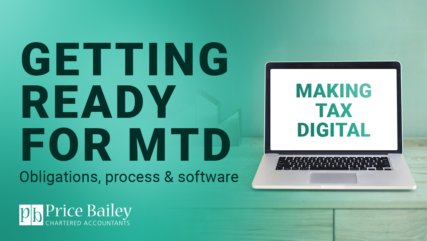
The Budget Q&A
Our experts unpack the key announcements of the highly anticipated Autumn Budget, explore the implications for businesses and individuals, and answer your questions live.
VAT is complex, but there are steps you can take to help
Many business owners think of VAT as a complex tax scheme that should be left to their accountants. Yes, it’s complex, and it’s always wise to get advice from your accountant, but there are a few steps you can take to help yourself.
Sounds like common sense, but VAT penalties are severe. While there’s usually no penalty for missing a VAT deadline for the first time, the percentage added to your account will increase with each subsequent default.
The safest way to avoid late payment is to set up a direct debit with HMRC, then your quarterly payment will be taken automatically from your business bank account.
There are four rates of VAT: exempt, zero, 5% and 20%. You need make sure you’re charging the right one. 20% is the ‘standard’ rate, which applies to most goods and services in the UK.
Once you’re registered for VAT, you must print your VAT number on all invoices, and apply the correct rate of VAT to all items.
HMRC offers several types of VAT scheme, some of which might benefit your business more than the standard VAT scheme. For example, the Cash Accounting VAT scheme lets you account for VAT only when you’ve been paid for any invoices you issue – providing obvious cash-flow benefits.
As its name suggests, the Flat Rate VAT scheme lets you apply a flat percentage to your turnover, to calculate how much VAT you need to repay to HMRC. So it makes your VAT accounting far simpler. The percentage varies according to the industry you’re in, but you could benefit, particularly if you don’t make a lot of purchases through your business. You also qualify for a 1% reduction in your flat rate percentage during your first year on the scheme.
Make sure you keep copies of all your invoices, VAT calculations, receipts and expenses. This will help you complete your quarterly VAT return accurately – and if you’re ever the subject of a VAT enquiry, you’ll be able to produce the correct information.
Contact us today to find out more about how we can help you

Our experts unpack the key announcements of the highly anticipated Autumn Budget, explore the implications for businesses and individuals, and answer your questions live.

This article looks at the practical steps GPs can take now to prepare for the Chancellor’s announcements and strengthen their financial position.

Our latest webinar, 'Getting ready for MTD – obligations, process and software', is now available on demand!

In this blog, we explore cricketers’ tax planning, career choices and long-term finances, and how investors and franchise owners are thinking about value, risk and the future of the sport.